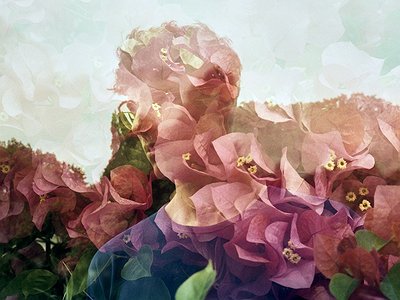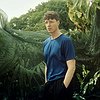Part 2
Could you describe your creative process on the basis of a piece or album that's particularly dear to you, please? Where did the ideas come from, how were they transformed in your mind, what did you start with and how do you refine these beginnings into the finished work of art?
It is clearly my latest album project on Kompakt Records which is based on some very personal experiences with anxiety after my cancer diagnosis in 2011. I was very lucky because the tumour was discovered in its early stages and I didn’t need chemo or radiation after my operation. However, I developed quite heavy anxiety during the five-year period of check-ups at the hospital. Regular therapy sessions didn’t work for me, so I got the idea that I wanted to describe those feelings and that life-changing period through an album project. Ambient has been something I listened to when I wanted to relax or when I travel because I am scared of flying… I find it quite healing to listen to ambient rather than other genres when I am stressed. So, in that way it was natural for me to try to describe my story through ambient soundscapes and in the recording process it became very therapeutic. I instantly knew that I wanted to team up with three musicians for the recordings, who know me personally and that I could openly share my very personal stories with - to have them help me transform specific emotions and points in time into instrumental compositions.
The synthesizers and space echoes and reverbs are the foundation of the album. I recorded them with my friend Claus Norreen in his Copenhagen studio. Afterwards I took all the stems to my own studio and edited and mixed them. I then recorded a Steinway Grand Piano with an amazing young producer, Jakob Littauer in a concert hall here in Copenhagen – and finally cello and violin was recorded with my Italian friend, the string composer Davide Rossi (who has worked with everyone from Coldplay to Ennio Morricone, The Verve and Jon Hopkins). It turned into a 100% analogue album - and you can really feel that when you listen to it, I think.
There are many descriptions of the ideal state of mind for being creative. What is it like for you? What supports this ideal state of mind and what are distractions? Are there strategies to enter into this state more easily?
For me, creativity comes and goes but I certainly am more creative when I am rested and not too stressed about other stuff. Often on vacations or after coming through a busy period, I get a moment of clarity that sparks an idea. I often don’t work on new music for weeks and I seem to release an album every two years or so. I need some time after the album is done and released before I can start another project. Time wipes the slate clean so to speak… so for me creativity is to wait for the inspiration to come to me and it can’t be forced but maybe nurtured by not being too busy. Unfortunately, that is often out of my control, also having a family life makes it more difficult…
How is playing live and writing music in the studio connected? What do you achieve and draw from each experience personally? How do you see the relationship between improvisation and composition in this regard?
I have been DJing for almost two decades now and slowly downscaling the number of gigs per year. I still find it fun and inspiring to play as a DJ and I guess as long as I continue to DJ I will continue to make club music, and the other way around. Those two things go hand in hand for me. But moving forward, I will be making a lot less four-to-the-floor music and focus on score music and music for advertising instead, while still producing music for album projects of mine.
How do you see the relationship between the 'sound' aspects of music and the 'composition' aspects? How do you work with sound and timbre to meet certain production ideas and in which way can certain sounds already take on compositional qualities?
I think the two are very related. I spend a lot of time mixing my music perfectly on my own - and that process is a big part of the actual production process for me, to be able to mix everything by myself. Another aspect of that is when I work with music and sound design for advertising, I often let the sound design take the lead in certain parts of the composition where the film requires more focus on, for example, movement sounds instead of chord progressions. Sometimes I even start with the sound design, placing and mixing everything right and then compose around these sounds, filling in the gaps. It really goes hand in hand.
Our sense of hearing shares intriguing connections to other senses. From your experience, what are some of the most inspiring overlaps between different senses - and what do they tell us about the way our senses work? What happens to sound at its outermost borders?
The hearing sense is deeply connected to the feeling sense. Music can be very physical and make you feel elevated or weighed down. We all know the feeling of bass in your chest at a live show - and how strings or a vocal piece can give you goose bumps or even make you cry. I have experienced sound that makes me dizzy and even nauseous. When you combine music with visuals you get to affect both the hearing, seeing and feeling senses at the same time and it can really be a strong experience. I think it was a Ryuichi Sakamoto installation I experienced in London a few years ago that really touched many of my senses.
Art can be a purpose in its own right, but it can also directly feed back into everyday life, take on a social and political role and lead to more engagement. Can you describe your approach to art and being an artist?
Previously in my career being an artist gave me a feeling of purpose just by making people dance and feel happy through escapism in club culture. I didn’t think much about having a political statement. I am very politically aware and I have strong opinions about the international political situation - but until a few years ago I found that it was not the role of an artist to be political. That has changed after the right wing has gained so much strength in the western world and especially after Trump became President in the US. It is a scary world we are living in - and now I think we all have a responsibility to speak up and use our voice. I often share articles and petitions from for example SumofUs or Avaaz via my social media channels and try to get people to take action both on a political level but certainly also in terms of climate change - that scares me more than anything.
My latest album, on a more human level, has proved to me that I have been able to help soothe my own symptoms of anxiety through listening to my own music - and I find it extremely rewarding to see that other people are experiencing the same.
It is remarkable, in a way, that we have arrived in the 21st century with the basic concept of music still intact. Do you have a vision of music, an idea of what music could be beyond its current form?
Maybe we might focus more about what music can do rather than what it can be. There are studies being made in hospitals here in Denmark about what music can do for people dealing with cancer and anxiety and I think that is very exciting to follow and learn more about. I think that music can also be even more political and help make change in the world by creating a movement.






